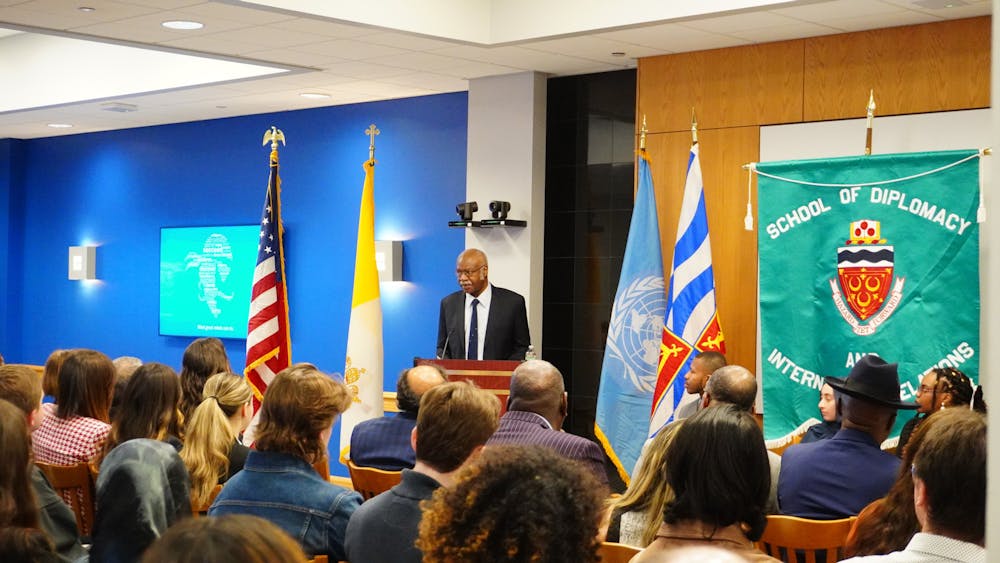Seton Hall’s School of Diplomacy and International Relations welcomed Ambassador Philemon Yang, president of the U.N. General Assembly, to the World Leaders Forum on April 16.
The School of Diplomacy and International Relations presents the World Leaders Forum once every semester. SHU hosted Nobel Laureate Nadia Murad in the fall.
As president of the U.N. General Assembly’s current session, Yang is responsible for chairing and presiding over the proceedings until 2026, overseeing the enforcement of procedural rules, and representing the assembly throughout U.N. committees and member states.
During the event, Yang was joined by Courtney Smith, dean of the School of Diplomacy and International Relations, and a group of current diplomacy students who asked the ambassador questions. Members of the audience, including more students, also asked questions.
One topic Yang discussed was how SHU shapes future diplomats.
“Your institution is a wonderful institution, and [it] contributes to what the United Nations is and [what it] will be in the future. How? By simply fostering knowledge, spreading the right knowledge, and sharpening critical thinking,” Yang said. “By making out of you diplomats, those who will lead us in the future, you are already doing a lot for the whole world, for the international community.”
Dean Martin Edwards, associate dean and professor in the diplomacy school, said that “teamwork” is what makes events like the World Leaders Forum successful, and that these “future diplomats,” as Yang stated, get a unique experience through their large role in these events.
“Our success in running events like this is solely due to the number of students who volunteer to help and the number of people from other university offices who also say ‘yes’ when we ask for help,” Edwards said. “Lots of universities bring notables to campus. What we try to do is integrate students into that experience by putting them into the conversation with these leaders.”
When asked how President Donald Trump’s new administration has affected international collaboration at the U.N., Yang said that the U.N. is still waiting to see what impact Trump will have.
“It is difficult to know what the position of the United States is concerning the United Nations,” Yang said. “But I can tell you that in the present world order that is the United Nations, the United States is a very key role and continues to play a key role all over the world, and so we are very optimistic that the U.S. will continue to play this modern role so that the U.N. can continue to function.”
Yang spoke on a wide range of topics, like how “any woman” could take on powerful positions in the U.N. and how aggression is diffused in the General Assembly setting.
“Our ambassadors are so well trained that during meetings, even when there is a disagreement, people don’t shout at each other,” Yang told The Setonian. “And I can tell you in my experience, the ambassadors are marvelous at choosing the words they use.”
Attendee David Gomez, a freshman diplomacy major, said he was interested in seeing Yang because of his esteem on the world stage.
“It’s just definitely the fact that you don’t consider that someone of that caliber could ever come to the university that you go to, or that really, they might even be here,” Gomez said. “It’s, like, just hearing the name is larger than life, and then you meet them in person, and you realize at the end of the day, people are people.”
SHU will continue inviting PGAs (Presidents of the General Assembly) like Yang to campus, according to Edwards.
“We send invites out in the fall, and for the PGA, it’s only in the spring when the team has time to pause and reflect on the term, so that’s an ideal time for them to talk publicly about it,” Edwards said. “This is the third PGA that we have had in a row, and we have every intention to invite the next one next spring.”
Robert Case, director of internships and career development in the diplomacy school, discussed the impact he believed Yang’s presence on campus would have on the university community.
“Students will be able to see a leader from a diverse background from the world stage, where he started, and where he’s come to,” Case said. “I think students will be able to see somebody who has found a place in the world scene and his ability to navigate it.”
Yang said he hoped to leave a legacy of positive change at the end of his term as president of the General Assembly.
“My most important legacy would be the discussion on the reform of the Security Council and the revitalization of the General Assembly,” Yang said. “Even if there is no final solution, I will be optimistic that in the future, or that another president of the General Assembly, will bring good things. So, my legacy is merely a dream at the moment, but as you know, many dreams become reality.”
Yang ended his visit at SHU with a message to students.
“You are not just observers of global affairs, you are contributors in many ways,” he said. “In fact, you are practitioners. Your ideas are important for the world. This session of the General Assembly has opened the space to the world’s hardest challenges. Your task is to keep that space open and fuel your ideas that are good, practical, and inclusive.”
Allison Bennett is a writer for The Setonian’s News section. She can be reached at allison.bennett@student.shu.edu.





